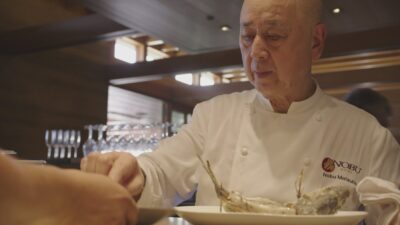Chef Nobu serves his famous miso cod with a side of inspiration in a new documentary
By Canadian Press on June 27, 2025.

NEW YORK (AP) — World-famous chef Nobuyuki Matsuhisa has been tantalizing foodies for decades as he built his empire to include more than 50 upscale restaurants and several luxury hotels. The new documentary, “Nobu,” reveals the man behind the cuisine in an intimate look at how he found success, despite several major setbacks.
The film traces Matsuhisa’s journey to creating his unique fusion cuisine, blending traditional Japanese dishes with ingredients discovered while living in Peru. Matsuhisa, now 76, was driven to run his own restaurant but faced obstacles, including financial woes, doubters and a devastating fire at one of his first spots.
Candid and sometimes emotional interviews with Matsuhisa are interspersed with mouthwatering shots of his “Nobu-style” culinary treats, made with a precision and standard of excellence his diners have come to expect. “Nobu” releases widely July 1.
Director Matt Tyrnauer and the chef himself sat down with The Associated Press to discuss his perseverance, creativity and influence on the culture. Answers have been edited for clarity and brevity.
AP: One of the most dynamic things about the film is the gorgeous food. How did you approach it, Matt?
TYRNAUER: Nobu started as a graphic designer, and you can really see it in the plates. The totality of his vision for creating a new type of cuisine, which he calls “Nobu style,” or the signature dishes, was really interesting, but also the beauty of the presentation, which is so important. We had cameras everywhere — on the ceiling, we had them over the shoulder, and anything to kind of get the precision and the detail. At a certain point in the film, you see him correcting some of the chefs who work for him and it’s a pretty tough process because he’s a perfectionist. I wanted to show that.
AP: There are many difficult moments in the film and you have to relive some pain from your past. How was that process for you Chef Nobu?
MATSUHISA: Even though my life was pain, but I learned from this pain. Also I learned lots and lots of love from people who supported me. So nothing is losing, in my experience. I’d like to say, at my age, I can say, I did my life.
AP: Matt, were there any surprises when you were shooting the film?
TYRNAUER: When he broke down on camera and couldn’t stop crying, it was a big surprise. I didn’t understand the true wound of the loss of Nobu’s best friend, Sakai. I’ve interviewed a lot of people. I’ve never had anyone really be so emotional. I thought it was extraordinary and very beautiful, actually, and very honest. Nobu invited me to go see the grave of his dear friend who had taken his own life and the pain and the suffering that we see on camera is unexpected in a movie that you think is just going to be about great food and the artistry of being a chef. There’s a soulfulness to it.
___
If you or someone you know needs help, the national suicide and crisis lifeline in the U.S. is available by calling or texting 988. There is also an online chat at 988lifeline.org
___
AP: Your world travel helped you develop your Nobu style. You’re still traveling and visiting restaurants. Can you talk about that?
MATSUHISA: I made the Nobu corporate teams. These teams that are traveling with me … they stand by at all the locations, and they set up, then they’re training for the next generations. The Nobu teams keep growing like a family, and they (are) working there long times so they understand Nobu’s quality, philosophy, the passions, how to do service. We have good teams.
AP: From “The Bear” to reality TV, there is high interest in what goes on in restaurant kitchens in pop culture now. Did that play into the film?
TYRNAUER: What I wanted to do was show the process and put that on display. Part of the secret to his success is that he’s actually created a very civilized culture, and it comes from the top down. I think that’s why he goes around the world like he does and visits all these restaurants and trains the chefs personally in his own style. But his own temperament is exemplary.
AP: What do you want people to take away from the film?
MATSUHISA: I’m very glad because I didn’t give up on my life. That’s the message. Even (when) the young people has a problem, I like to say, “Don’t give up. Just don’t forget about the ambitions, passions and go step by step.”
Brooke Lefferts, The Associated Press
-23




